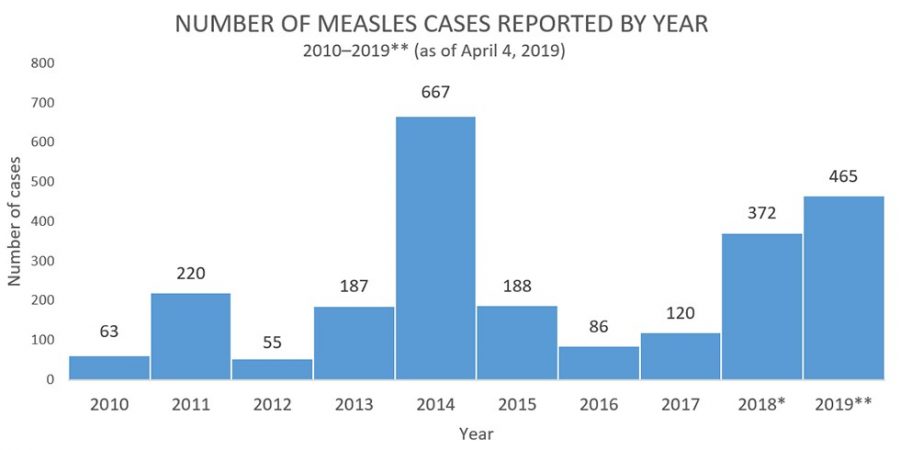Measles Outbreak in U.S. Contributes to the Rise of the Internet Censorship
The United States faces a measles outbreak of massive proportions as the second-highest number of cases have been reported for January to April of this year. Some people have begun to blame anti-vaxxers as the cause of such outbreaks in the U.S., leading to censorship of anti-vaccination content online. (Photo Credit: https://www.cdc.gov/measles/cases-outbreaks.html.)
April 15, 2019
Outbreaks of certain infectious diseases, including measles, appear to be on the rise in the United States, and in response, several social media platforms have taken action to silence anti-vaccination rhetoric on their sites.
According to the Centers for Disease Control and Prevention (CDC), there have been 465 individual cases of measles confirmed in 19 states in the U.S. for 2019. This is the “second-greatest number of cases reported in the U.S.” since measles was declared eliminated in the year 2000. The year with the greatest number of U.S. cases reported from January to April was 2014, with 667 cases of measles reported during those months.
While measles in the U.S. is typically treatable–the last measles-related death in the U.S. was in 2015–the recent spike in the number of confirmed cases has incited panic and discord in some communities, and even public health professionals note that while it will not necessarily continue, “the increase is alarming.” In particular, many are pointing at “anti-vaxxers”–the term used to describe people who oppose receiving vaccinations for various reasons—as a major cause for the outbreak of measles in the U.S.
The CDC has corroborated that measles can spread more easily in communities with high numbers of unvaccinated people, and also notes that the majority of people who contract the measles are unvaccinated. It is widely held that low vaccination rates are a major cause for outbreaks of certain infectious diseases in the U.S.; however, some people express skepticism regarding whether anti-vaxxers themselves are truly the cause of low vaccination rates, or whether there are other underlying causes, such as poverty and inaccessibility, which may better explain these low rates. Nevertheless, it appears that a majority of people in the U.S. agree that vaccines are necessary and safe for healthy children to receive, and in recent months, concern and anger against anti-vaxxers seems to have risen as people cite the threat which this belief may pose against other members of the community, especially those who cannot be vaccinated for medical reasons, or the very young and very old.
This distrust against anti-vaxxers has long been revealed in the comment sections of articles and videos related to the topic on various platforms, but now, in the wake of the rising number of measles cases in the U.S., it appears that multiple social media platforms are taking action to remove any content which spreads anti-vaccination beliefs. Amidst much controversy, Facebook announced its plan to work towards making posts against vaccination more difficult to find on the site. Although anti-vax posts and pages will not be removed, Facebook claims that they will no longer feature this type of material, nor recommend the content to users. This decision comes in the light of increasing pressure upon the site to reduce what some people call “misinformation,” which they consider to be a threat to society because of their belief that this misinformation has the potential to render the herd immunity ineffectual.
Other websites have followed suit. Similar to Facebook, Pinterest has also begun to restrict the anti-vaccination-related content which can be accessed through search results or which is shown in advertisements. YouTube has begun to demonetize videos which discourage parents from vaccinating their children, and the site has also removed advertisements with similar messages. Amazon has removed certain anti-vaccine books and documentaries from its video streaming service on Amazon Prime.
This is not to say that everyone believes that censoring anti-vaccination rhetoric is the most effective, or the most ethical way, of preventing future outbreaks of infectious diseases; however, in terms of why social media platforms face increasing pressure to censor anti-vaccination rhetoric online, it should be understood that measles is just the tip of the iceberg. Cases of other preventable diseases, or diseases which had been fully eradicated until recently within the U.S., have also been reported within recent years. One obvious example is the outbreak of acute flaccid myelitis (AFM) within the United States at the beginning of 2019. AFM is a rare, polio-like illness, which saw a record-breaking 193 confirmed cases as of Jan. 4. The Mayo Clinic suggests that vaccinating against poliovirus may help in preventing the contraction of AFM.
Measles, a disease once believed to be completely eradicated from the U.S., is back in full force. People on both sides of the issue work to make their voices heard amidst all the noise.




